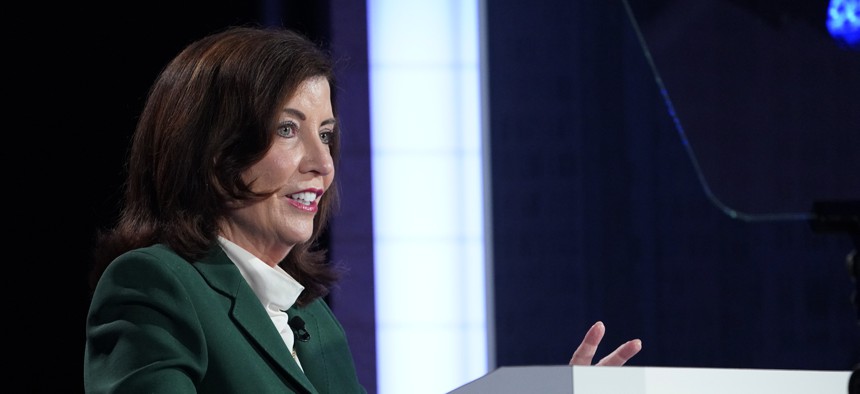New York governor pledges to ‘shape the trajectory’ of AI development

John Lamparski/Getty Images
Kathy Hochul announced in her State of the State address an AI consortium and research center, and issued a new policy for responsible AI governance.
In the race to lead the nation in both harnessing and regulating artificial intelligence, New York Gov. Kathy Hochul unveiled a proposal in her State of the State address Tuesday that she says will make the Empire State a “national leader in AI research and innovation.”
Under the proposal, New York will invest $400 million in the so-called Empire AI Consortium, according to Hochul. The group will create and launch an AI computing center in upstate New York to promote responsible research and development, create jobs and determine AI use cases that can benefit the public.
The effort follows California’s executive order this summer to study the development, use and risks of AI. Gov. Gavin Newsom also called the state’s plan nation-leading. A state task force subsequently released a report outlining various use cases for the technology in state government, including more efficient workflows and better communication with residents.
The New York governor’s announcement also comes after New York City issued an AI action plan this fall, which focuses on building employee skills and updating its procurement rules.
New York’s consortium will be made up of seven founding institutions: Columbia University, Cornell University, New York University, Rensselaer Polytechnic Institute, the State University of New York (SUNY), the City University of New York and the Simons Foundation research group.
Of the $400 million in funding for the project, the state will provide $275 million through grants and other funding mechanisms, and the founding institutions and private sector will contribute $125 million.
“Since the days of the Erie Canal, New York has always led the nation on technology and innovation,” Hochul said. “The Empire AI consortium will be transformative: bringing jobs and opportunity to New York and making us a global leader in this groundbreaking sector.”
Hochul said the collaboration between the seven institutions will help achieve efficiencies of scale, expand educational opportunities and encourage responsible innovation. The University of Buffalo is being considered as a potential site for the AI computing center the consortium plans to establish.
Hochul unveiled the Empire AI Consortium at the same time the state Office of Information Technology Services issued a new policy to establish guidelines for how state agencies can evaluate and adopt AI systems. The policy will help the state government remain vigilant about “evaluating risks, preserving privacy and protecting against unwanted outcomes,” according to a fact sheet.
“The establishment of the first-ever statewide policy governing AI will serve as a roadmap to leverage this rapidly emerging technology to find maximum benefit while mitigating risk, and complement the extraordinary work our employees are already doing to benefit the people of New York,” Dru Rai, CIO and director of the Office of Information Technology Services, said in a statement.
The policy says that agencies must use AI “to further their mission and meet critical business needs,” and must comply with state and federal law, as well as existing state policies. Agencies also must make sure that AI systems are not making decisions that impact residents without human oversight, and ensure that systems’ methodologies are well documented. Any system that uses AI should be publicly disclosed, in the interest of transparency, according to the policy.
Agencies are required to undertake a risk assessment of any new AI system they wish to use, including a review of security, privacy, legal, reputational and competency risks, as outlined by the National Institute of Standards and Technology’s Artificial Intelligence Risk Management Framework.
The Office of Information Technology Services is responsible for keeping an inventory of operational AI systems and making that list as publicly available as practical. But it is agencies that are responsible for making sure their AI systems are appropriately used, and that privacy is properly protected.
Agencies are also responsible for ensuring that AI systems continue to meet their business needs, given how quickly the technology evolves, the policy said. That includes regular retraining of those AI systems, while also ensuring standards are open.
In the State of the State, Hochul pledged to establish an interagency advisory working group that will meet regularly and provide recommendations on the adoption and use of AI and new developments in the technology. State officials said the group will also partner with SUNY and other educational institutions to share ideas on AI and help develop the workforce.

NEXT STORY: Employees need drastic reskilling to deal with generative AI’s data needs






